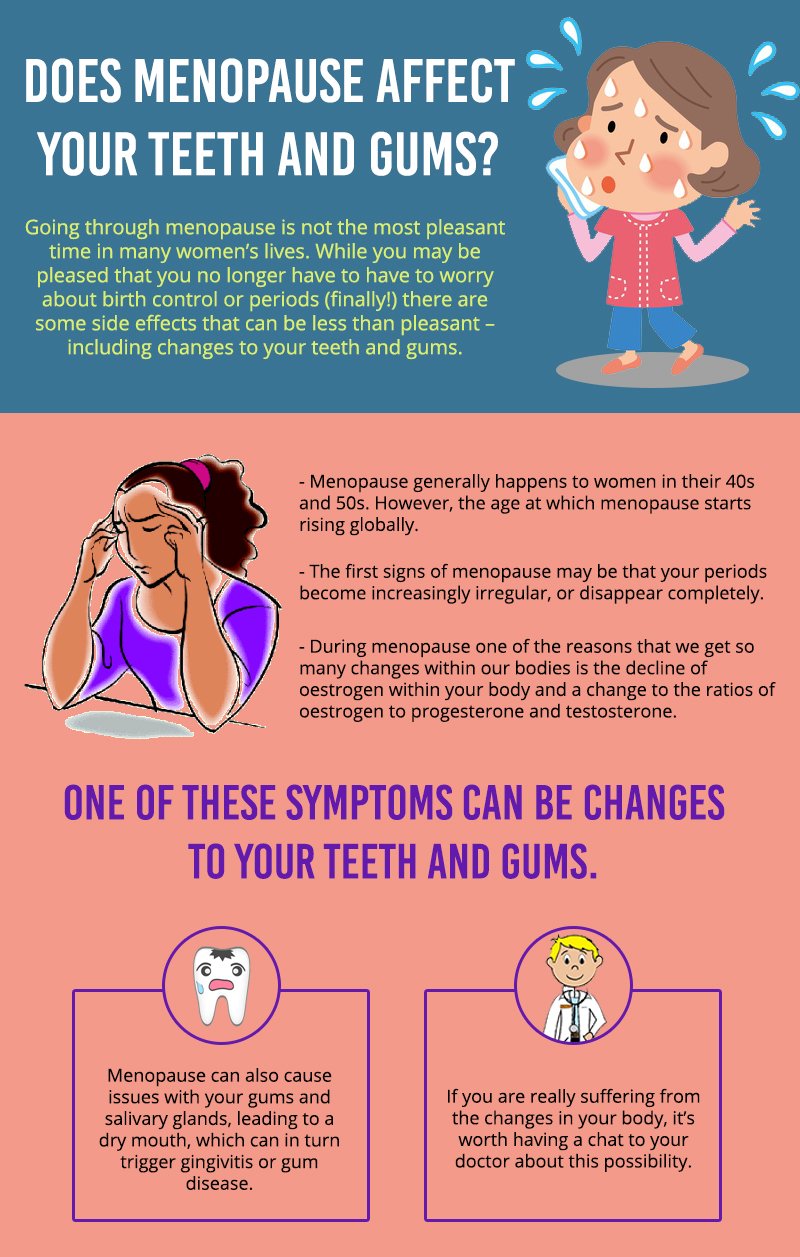Menopause is a natural process that all women experience as they age. Unfortunately, it can also have a significant impact on your oral health. Changes in hormone levels during menopause can lead to a number of oral health issues, including dry mouth, gum disease, and an increased risk of tooth decay. It is important to be aware of these potential issues and take steps to protect your oral health during menopause. This article will discuss how menopause can affect your oral health and provide tips for maintaining good oral hygiene during this time.
The Link Between Hormonal Changes and Oral Health During Menopause
Menopause is a natural part of the aging process for women, and it is associated with a variety of physical and emotional changes. One of the most significant changes that women experience during menopause is a decrease in their estrogen levels. This decrease in estrogen can have a significant impact on oral health, as it can lead to an increased risk of developing certain oral health problems.
The decrease in estrogen levels during menopause can cause the gums to become more sensitive and vulnerable to infection. This is because estrogen helps to keep the gums healthy by stimulating the production of collagen, which helps to keep the gums strong and resistant to infection. Without adequate levels of estrogen, the gums become more prone to inflammation and infection, which can lead to gum disease.
In addition to the increased risk of gum disease, the decrease in estrogen levels during menopause can also cause dry mouth. This is because estrogen helps to stimulate the production of saliva, which helps to keep the mouth moist and free of bacteria. Without adequate levels of estrogen, the mouth can become dry and more prone to infection.
Finally, the decrease in estrogen levels during menopause can also cause a decrease in the production of protective proteins in the saliva. These proteins help to protect the teeth from decay and cavities, so without them, the teeth are more vulnerable to damage.
Overall, the decrease in estrogen levels during menopause can have a significant impact on oral health. Women who are going through menopause should be sure to take extra care of their oral health, as they are more vulnerable to certain oral health problems. Regular visits to the dentist and proper oral hygiene can help to minimize the risk of developing these problems.
How to Manage Oral Health During Menopause
Menopause is a natural part of aging for women, and it can bring about many changes to the body. One of the most common changes is an increase in oral health issues. During menopause, women may experience dry mouth, gum disease, and tooth decay. It is important to take steps to manage oral health during menopause to ensure that your teeth and gums remain healthy.
The first step in managing oral health during menopause is to make sure you are brushing and flossing regularly. Brushing your teeth twice a day and flossing once a day will help to remove plaque and bacteria that can cause tooth decay and gum disease. It is also important to use a toothpaste that contains fluoride, as this can help to strengthen your teeth and protect them from decay.
In addition to brushing and flossing, it is important to visit your dentist regularly. During menopause, your hormones can cause changes in your mouth that can lead to oral health issues. Your dentist can examine your mouth and check for any signs of decay or gum disease. If any issues are found, they can be treated quickly and effectively.
It is also important to watch what you eat and drink during menopause. Sugary and acidic foods and drinks can increase your risk of tooth decay, so it is best to limit your intake of these. Instead, opt for foods that are high in calcium and vitamin D, as these can help to strengthen your teeth and gums.
Finally, it is important to stay hydrated during menopause. Dry mouth can increase your risk of tooth decay and gum disease, so it is important to drink plenty of water throughout the day. This will help to keep your mouth moist and reduce your risk of oral health issues.
Managing oral health during menopause is essential for maintaining healthy teeth and gums. By brushing and flossing regularly, visiting your dentist regularly, watching what you eat and drink, and staying hydrated, you can help to ensure that your oral health remains in good condition.
The Impact of Menopause on Gum Disease
Menopause is a natural transition in a woman’s life that can bring about many physical and emotional changes. While menopause is a normal part of aging, it can also have an impact on oral health, particularly gum disease.
Gum disease, also known as periodontal disease, is an infection of the gums and the supporting structures of the teeth. It is caused by the buildup of plaque and bacteria in the mouth, and it can lead to tooth loss and other serious health problems.
During menopause, women experience a decrease in the production of estrogen and progesterone. These hormones play an important role in keeping the gums healthy. When estrogen levels decrease, the gums become more vulnerable to infection and inflammation. This can lead to an increase in the severity of gum disease.
Studies have also shown that women who are going through menopause are more likely to suffer from gum disease than women who are not. This is due to the fact that menopause can cause a decrease in saliva production, which can lead to an increase in bacteria in the mouth.
The good news is that there are steps that can be taken to reduce the risk of gum disease during menopause. Brushing and flossing regularly can help to remove plaque and bacteria from the mouth, and regular visits to the dentist can help to detect any signs of gum disease early. Additionally, eating a healthy diet and avoiding smoking can help to reduce the risk of gum disease.
Menopause can have a significant impact on oral health, and it is important for women to be aware of the risks associated with gum disease. By taking steps to maintain good oral hygiene and visiting the dentist regularly, women can reduce their risk of gum disease and keep their teeth and gums healthy.
The Role of Diet and Exercise in Maintaining Oral Health During Menopause
Menopause is a natural process that all women experience as they age. During this time, women experience a variety of physical and emotional changes, including changes in oral health. As hormone levels fluctuate, women are more likely to experience dry mouth, tooth decay, and gum disease. Fortunately, there are several steps that women can take to maintain their oral health during menopause.
The most important step in maintaining oral health during menopause is to maintain a healthy diet. Eating a balanced diet that is rich in fruits, vegetables, and whole grains can help keep teeth and gums healthy. It is also important to limit sugary and acidic foods, as these can cause tooth decay. Additionally, women should drink plenty of water to keep their mouths hydrated and to wash away food particles.
In addition to a healthy diet, regular exercise is also important for maintaining oral health during menopause. Exercise helps to increase blood flow to the mouth, which can help to keep the gums healthy. Exercise also helps to reduce stress, which can be a major contributor to oral health problems.
Finally, it is important to visit the dentist regularly for checkups and cleanings. During menopause, women may be more prone to developing gum disease, so it is important to have regular checkups to ensure that any problems are caught early. Additionally, regular cleanings can help to remove plaque and tartar, which can lead to tooth decay.
By following a healthy diet, exercising regularly, and visiting the dentist regularly, women can maintain their oral health during menopause. Maintaining good oral health is an important part of overall health, and taking the necessary steps to keep teeth and gums healthy can help women to stay healthy and happy during this time.
Understanding the Connection Between Menopause and Tooth Loss
Menopause is a natural biological process that marks the end of a woman’s reproductive years. During this time, the body undergoes a number of changes, including a decrease in the production of hormones such as estrogen and progesterone. While these changes can have a variety of effects on a woman’s health, many women are unaware of the connection between menopause and tooth loss.
Tooth loss is a common issue for many women during menopause. This is due to the fact that the decrease in hormone production can cause a decrease in saliva production. Saliva is essential for keeping the mouth clean and healthy, and a decrease in saliva can lead to an increase in bacteria and plaque buildup. This can cause an increase in cavities and gum disease, which can lead to tooth loss.
In addition to a decrease in saliva production, menopause can also cause a decrease in bone density. This can lead to a decrease in the strength of the jawbone, which can make it easier for teeth to become loose and eventually fall out.
The good news is that there are steps women can take to reduce their risk of tooth loss during menopause. These include practicing good oral hygiene, such as brushing and flossing regularly, and visiting the dentist for regular checkups. Additionally, women can talk to their doctor about hormone replacement therapy, which can help to restore hormone levels and reduce the risk of tooth loss.
Understanding the connection between menopause and tooth loss is important for women of all ages. By taking steps to maintain good oral hygiene and visiting the dentist regularly, women can reduce their risk of tooth loss and keep their smile healthy and beautiful.
Conclusion
In conclusion, menopause can have a significant impact on your oral health. It can cause dry mouth, which can lead to an increased risk of cavities and gum disease. It can also cause hormonal changes that can lead to a decrease in saliva production, which can cause tooth decay and bad breath. Additionally, menopause can cause changes in the texture and color of your teeth, as well as an increased risk of developing oral cancer. Taking care of your oral health during menopause is essential to maintaining good oral health. Regular visits to the dentist, brushing and flossing twice a day, and avoiding sugary and acidic foods can help keep your mouth healthy during menopause.


